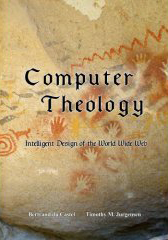PRESS
COMPUTER THEOLOGY |
||||
|
secular systems, at least
within the Treason is a
crime specified by the Constitution. From the perspective of the model that we
are pursuing, treason entails an act of apostasy against the trust
infrastructure that forms the basis of governance within the The first of the
Ten Commandments found in both Christianity and Judaism includes the
admonition, “Thou shall have no other gods before me.” In either religion, to
renounce the primacy of God is to commit an act of apostasy. Within a theistic
religion, the specification of policy is typically perceived to come directly
from the deity. Hence, the admonition is one grounded within the trust infrastructure
of the social ecosystem. Under both Christianity and Judaism, the punishment
for leaving the faith is a judgment to be ultimately rendered by God. Under
Roman Catholicism, the limit of earthly punishment is typically
excommunication; in essence, a direct recognition by the social order of the
act of the apostate. Under Islam, the crime of apostasy is treated much more
severely; particularly within theocratic states. There, the punishment can be death.
With respect to
the concept of sovereign immunity, the major theistic religions indicate that
the actions of God are without limit and without suppliant recourse. We will
consider this concept in a bit more detail in Chapter 10. For the moment, we
note that within these theistic religions, God is perceived to work in
mysterious ways and for reasons not to be questioned by man. The net result is
that one can sue neither God nor government. Just as
ostensibly secular governance often takes on the trappings of religious ritual,
religious dogma in turn insinuates itself into secular government through the
establishment of community morals and tenets of ethical conduct. Within the Christian Bible, Jesus establishes a
demarcation between church and state through the admonition “Render unto Caesar
the things which are Caesar’s, and unto God the things that are God’s.”
Although Western Democracy as typified by the |
||||
|
||||
© Midori Press, LLC, 2008. All rights reserved for all countries. (Inquiries) The contents of ComputerTheology: Intelligent Design of the World Wide Web are presented for the sole purpose of on-line reading to allow the reader to determine whether to purchase the book. Reproduction and other derivative works are expressly forbidden without the written consent of Midori Press. Legal deposit with the US Library of Congress 1-33735636, 2007.
|
ComputerTheology Intelligent Design of the World Wide Web Bertrand du Castel and Timothy M. Jurgensen Midori Press, Austin Texas 1st Edition 2008 (468 pp) ISBN 0-9801821-1-5 |
Book available at Midori Press (regular) |
